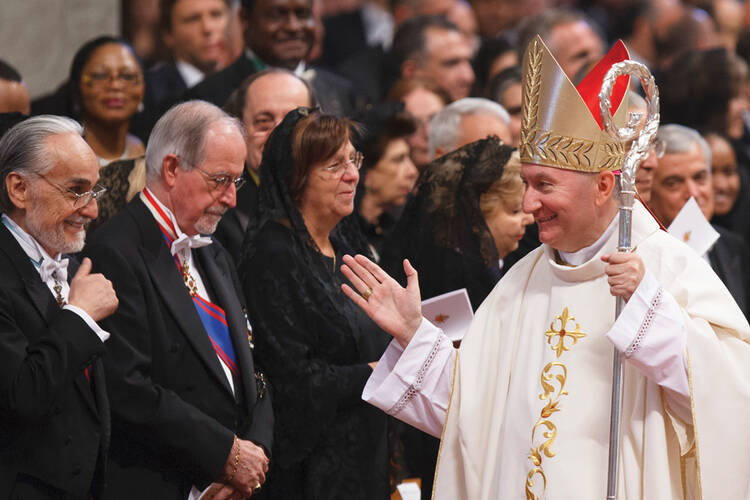Pope Francis has appointed Archbishop Pietro Parolin, 58, a longtime official in the Vatican Secretariat of State and nuncio to Venezuela since 2009, to be his secretary of state.
Although Pope Francis has not been afraid to break with convention during his brief pontificate, the appointment of a seasoned member of the diplomatic corps signals a return to a longstanding tradition.
On Oct. 15 Archbishop Parolin will succeed Cardinal Tarcisio Bertone, 78, who came to the post in 2006 after serving as archbishop of Genoa, Italy.
In the current Vatican organizational framework, the secretary of state is the pope’s closest collaborator, the one who traditionally makes sure that the pope’s policies and priorities became concrete in the work of Vatican offices. The secretary usually is very close to the pope and meets with him often. He coordinates the work of the entire Roman Curia, overseeing the operation of the Vatican press o ffice and newspaper, coordinating the preparation and publication of papal documents, and supervising the work of Vatican nuncios both in their relations with the Catholic communities in individual countries and with their governments.
But in discussions about the reform and the reorganization of the Curia, many observers have mentioned the possibility that the role of the secretary of state role may change. Because it is so broad—covering the internal workings of the Vatican, international church affairs and foreign relations—Cardinal Bertone often was blamed, at least by the press, when things went wrong during the pontificate of Pope Benedict XVI.
The appointment of then-Archbishop Bertone as secretary of state in 2006 raised some eyebrows because most of the time until then—although not always—the position had been held by a prelate who had come up through the ranks of the Vatican diplomatic corps. Cardinal Bertone had a background as a Salesian pastor, archbishop and Vatican official dealing with doctrinal matters.
Archbishop Parolin was born Jan. 17, 1955, in Schiavon, Italy, and was ordained to the priesthood in 1980. He studied at the Vatican diplomatic academy and in 1986 began working at Vatican embassies, serving in Nigeria and in Mexico before moving to the offices of the Vatican Secretariat of State. He was named undersecretary for foreign relations in 2002.
For years, Archbishop Parolin led annual Vatican delegations to Vietnam to discuss church-state issues with the country’s Communist government, a process that eventually led to Vietnam’s acceptance of a non-resident papal representative to the country. The move is seen as a step toward establishing full diplomatic relations.
While at the Vatican, Archbishop Parolin also represented the Vatican at a variety of international conferences on climate change, human trafficking and the Israeli-Palestinian conflict, including leading the Vatican delegation to the Middle East peace conference in Annapolis, Md., in 2007.
At a press conference in 2006, Archbishop Parolin said Vatican nuncios and papal representatives play an important role “in defending the human being” and in strengthening the local churches, especially in regions where Christians face poverty, discrimination or other hardships.
The Vatican’s presence around the world through its nuncios shows people that the church and the pope are always near, that Christians no matter how small their numbers—are not alone in the world, he said.








